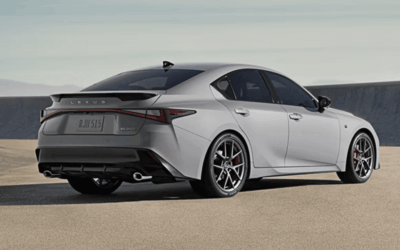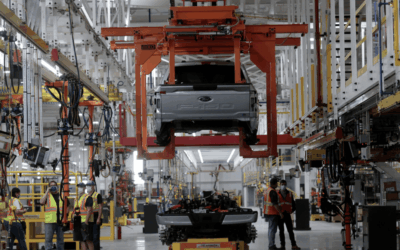Here at CarEdge, we get a lot of emails from car buyers like you looking for advice on how to get the best car deal possible. The question “should I pay cash for a car?” Comes into our inbox daily. If you’ve managed to save up enough cash to buy a car, kudos to you. Now, it’s time to be strategic about how you use it to get the best car deal possible.
Most people assume that telling a car dealer that you’re paying in cash is a negotiating tactic and will get you a better price. Here’s the truth: it doesn’t. Saying that you’re paying with cash kills your negotiating power.
If you’re wondering, “should I pay cash for a car?” The answer is complicated. Yes, pay the full amount as soon as possible. But don’t walk in with a briefcase of cash and slam it on the salesperson’s desk.
To understand how to answer this question, we need to begin by looking at how dealerships make their money.
How Car Dealerships Make Their Money
Car dealerships make about a quarter of their profit off car sales, yet vehicle sales make up about half of their revenue. That’s because of the slim front-end margins on most car deals (especially for new cars, used cars are a bit of a different story.)
You’ve heard me say it before, and you’ll hear me say it again—selling cars is merely a means to sell other products like finance options, insurance products, service, and parts.
Car dealerships make most of their money in the service department, but when it comes to vehicle sales, dealerships make their money in the Finance and Insurance (F&I) office. The F&I office is referred to as the “back-end” of a car deal. The “front-end” is what you spend time negotiating with the salesperson. The irony is that dealers are incentivized to sell as many cars as possible (frequently at a loss) simply to make money on the back-end (and from manufacturer incentives).
If you’ve ever bought a car before, you’ve heard a salesperson ask you “do you plan to finance the vehicle?” This is because if they know you plan to finance (and especially if you intend to finance through the dealership) they know the dealership can make money on the back-end of the car deal. Every car dealership out there will ask you to fill out a credit application so they can secure financing options for you. When they do this, they bake profit into the numbers. This practice is a significant source of profit for a car dealership.
So, if you walk in and say you’re paying with cash, you’re telling the salesperson that you’re going to eliminate the dealership’s primary source of profit.
What do you do? You take out a loan.
Take Out A Loan Instead
Let’s say you have all this cash, and you want to buy your car at the best possible price. It should be as simple as buying a meal at a restaurant, right? Unfortunately, that’s not the case.
You’ll pay far more for your car if you ask to pay for it all upfront with cash. That’s because the dealership will not be willing to negotiate as much on the front-end of the car deal since you will not become a sales opportunity for the back-end of the deal (aka in the F&I office).
So what should you do? Take out a loan through the dealership and pay it off immediately (or refinance it). Doing this will get you a much lower price than paying with cash at the dealership.
Like we discuss in depth in Deal School, you want to negotiate the out the door price of the vehicle with the salesperson. By informing them of your interest in financing your purchase through the dealership, you’ll find that the salesperson will be more likely to negotiate on the front-end of the deal.
One rule of thumb is that if it’s taxable, it’s negotiable. If a fee is not taxed, you can’t negotiate it down or away. It’s important to know exactly what you can negotiate.
Here’s the essential part of the entire process: make sure the loan does not have a prepayment penalty. If it does, walk away or ask for a different lending option. Fortunately, most loans do not have a prepayment penalty. Typically only exclusive financing options from captive lenders (the manufacturer’s lending institution) have these clauses.
It’s advisable not to tell the dealer that you plan to pay off or refinance the loan immediately. Dealerships incur “chargebacks” when this happens, so let this strategy be our little secret, and not something you blurt out to the F&I manager.
When you’re in the F&I office, decide if you want any of the ancillary products like an extended warranty, and then go through with the rest of the paperwork with the F&I manager. Once you’re happy with all the numbers, pay your down payment, sign the paperwork, and drive away.
Pay Off Your New Loan
You’ve got a brand-new car and a brand-new loan. It typically takes a lender about a week to put a new loan on the books once they receive it from the dealership. Wait about two weeks, then call your lender and ask for the payoff amount. They’ll tell you exactly how much you have to pay to end your loan. Send them a check or wire transfer, and you’re done.
If you don’t have enough cash to pay off your loan immediately, look to refinance the existing loan. However, if you took advantage of a rare zero-APR financing incentive, don’t expect to find anything better out there.
Remember that credit checks within a 30 days period for an auto-loan are grouped into one “hit” on your credit, so you don’t have to be too concerned about getting your credit run once again to find refinance opportunities.
You may have done it by way of a loan, but this is the best way to use your cash to buy a car. If you skip the loan and pay for the car entirely in cash, you’ll end up paying far more than if you take out a loan and pay it off early.
Assess Your Financial Situation
Now that we’ve unveiled our master plan for how to use your cash most effectively to buy a car, we should take a step back and ask if it’s a good idea in the first place.
If you’re asking “should I pay cash for a car,” we’re assuming you have a hefty savings account and financial portfolio. However, if paying cash for a vehicle will drain your savings completely, it might make more sense to finance the loan and put a large amount down for your down payment.
It’s also worth shopping around for different financing offers. No matter what, we always recommend having a pre-approval from an outside financial institution before you go to the dealership so that you have leverage when you are in the F&I office. In some cases, captive lenders offer special financing offers (like 0% APR) that no outside lender can beat. In those cases, financing through the dealership is the only logical option.
Not Directly or Not at All
Since you now know paying for a car with cash won’t get you a better deal, you might want to reconsider the entire idea. Is this the best use of your cash? If you still think it is, make sure you take out a loan and immediately pay it off instead.
It’s vital that you don’t tell the salesperson, sales manager, or F&I manager that you’re going to pay off the loan immediately. They really don’t want to incur the chargeback.
Instead, go through the motions of taking out a loan and simply pay it off a week later. With this strategy you’ll get the best car deal possible.













Interesting information on how car dealers make money and paying cash vs financing.
–What are the best places to finance?
–What is a good amount to put down on a car, does it doesn’t make a large difference in payments?
— Is it better to put a large down payment, or hold it and put a large amount on the loan?
–If the loan doesn’t require a payment for several month’s is it okay to start paying on it immediately? Does this save interest?
— Being December, when I’ve been told it best to look for a car. Is it best to look for a car before or after Christmas?
Wondering if you need to look for language in the contract about penalties for paying off the loan early? For example, X months of interest is due to pay off the loan before X months.
You’re always better off paying cash for a vehicle. Unless you obtain zero interest financing. And even then sometimes there’s a catch.
time value of money folks
Assuming good to excellent credit, minimize upfront costs and invest what you save. If your returns can safely beat your cost of interest, you’re winning.
If you can assume a low rate and modest returns on investment (that beat the interest rate) paying the loan off “quickly” or upfront is almost always more expensive.
That’s why you should never buy private (and so pay cash up front) if you’ve got good credit and access to equity markets. It’s way, way, more expensive – even when you take cost of interest into account.
Leasing and paying off may also be a good deal. Currently on 2020 Acura MDX’s, there is a $8600 factory lease incentive at the standard money factor. This is almost 2X the rebate at the “special” money factor. The rebate is $5500 if you finance through Acura.
Even with paying the acquisition fee and lease fees, leasing at the higher money factor and rebate, then rapidly paying the lease off can be cheaper than buying outright.
Personally, I like to pay cash: UNLESS the interest rate is close enough to $0 that it’s worth the extra expense. However, telling the dealer I’m paying cash is definite mistake.
My biggest wish is to be given straightforward honest info when buying a car at a dealership. I’ve listened and read a lot of advice and I understand the advice given here about taking the loan and the advantage it may pose. But…if I want the dealership to be straightforward, I’m not comfortable with misleading them even if it means I pay more for the car. So, maybe this strategy isn’t always the best if a person wants transparency from the salesman who’s selling the car. How can I ask for no games to be played if I’m playing one?
I bought a car earlier this month and what I simply did was secure a loan up front from a local credit union and negotiated entirely online comparing the prices of four different dealerships. None took my initial offer and one chased. The one who chased honored the price of another vehicle I was interested online. They got my business. By letting them know I had secured an outside loan but also providing a credit app they never even tried to sell me anything. They did 100 percent chince me on my trade in but since I said yes to that the fault utlimately lies with me. I used some of the tips I learned here.
I have to disagree with this article, at least as it applies to my situation. I’m looking for a Toyota and there are incentives offered of $3000 with cash, and 0% interest plus $500 if financed. These are mutually exclusive so you have to choose one or the other, which means if you intend to pay cash you don’t want a loan because the price is $2500 higher.
I just purchased a 2021 GMC AT4 Canyon. After researching the stock at every dealership within 300 miles for about 30 days, I saw that these trucks were selling before even arriving at the dealerships. I found the exact color and options on a truck that I wanted “in transit” at a dealer ~300 miles away.
Between “employee pricing” and “Customer Cash” (which was only available with financing) I saved ~ $4000 off MSRP. Negotiation as per your browser extension was very low as these trucks seem to have a high demand.
I had them Prep the truck before I arrived, and I pre applied for GMAC credit on line and printed Insurance cards to bring with me. I transferred plates from another car and was in and out of the dealership in less than 2 hours.
When I asked about prepayment penalty on the financing , they said you have to make about 6 payments before you pay it off. I had researched GMAC financing and they had no pre payment penalty. so they just made that up. I waiting for GMAC to contact me for payment options to get the pay off amount. Your advice to not pay cash seemed to save me some money.